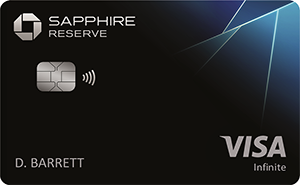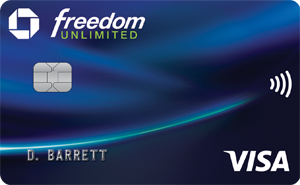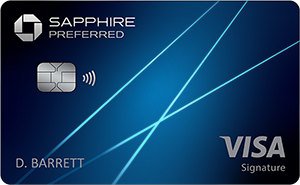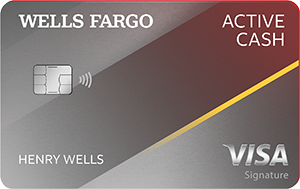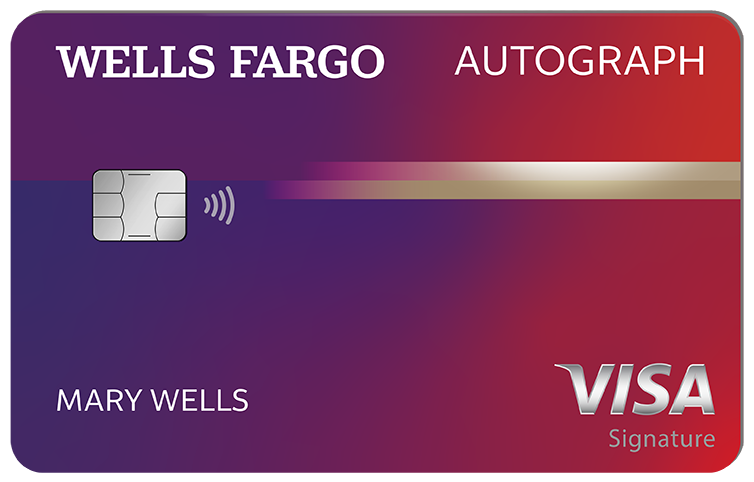Best Visa credit cards of April 2024
Updated 4:30 p.m. UTC April 16, 2024
Editorial Note: Blueprint may earn a commission from affiliate partner links featured here on our site. This commission does not influence our editors' opinions or evaluations. Please view our full advertiser disclosure policy.
The Visa payment network is widespread across the globe and offers an array of perks and benefits such as auto rental collision damage waiver, fraud protection, roadside assistance, purchase protections and more.
We analyzed all of the available Visa credit cards to compile a list of the very best Visa credit cards for April 2024.
Best Visa credit cards
- Best luxury travel Visa card: Chase Sapphire Reserve®
- Best no-annual-fee Visa card: Chase Freedom Unlimited®
- Best mid-priced travel rewards Visa: Chase Sapphire Preferred® Card
- Best flat-rate Visa cash-back card: Wells Fargo Active Cash® Card
- Best Visa card for transit: Wells Fargo Autograph℠ Card
- Best 0% introductory APR Visa card: Wells Fargo Reflect® Card *
- Best travel rewards Visa card: Capital One Venture X Rewards Credit Card *
- Best Visa airline card: United℠ Explorer Card *
Why trust our credit card experts
Our team of experts evaluates hundreds of credit cards and analyzes thousands of data points to help you find the best card for your situation. We use a data-driven methodology to determine each rating. Advertisers do not influence our editorial content. You can read more about our methodology below.
- 250+ cards analyzed.
- 10+ data points considered.
- 5-step fact-checking process.
Compare the best credit cards for Visa credit cards
Earn 60,000 bonus points after you spend $4,000 on purchases in the first 3 months from account opening. That’s $900 toward travel when you redeem through Chase Travel℠.
Earn an extra 1.5% on everything you buy (on up to $20,000 spent in the first year) — worth up to $300 cash back. That’s 6.5% on travel purchased through Chase Travel, 4.5% on dining and drugstores, and 3% on all other purchases.
Earn 60,000 bonus points after you spend $4,000 on purchases in the first 3 months from account opening. That’s $750 when you redeem through Chase Travel℠.
Earn a $200 cash rewards bonus after spending $500 in purchases in the first 3 months.
Earn 20,000 bonus points when you spend $1,000 in purchases in the first 3 months – that’s a $200 cash redemption value.
$200 online cash rewards bonus after you make at least $1,000 in purchases in the first 90 days of account opening.
Earn 75,000 bonus miles when you spend $4,000 on purchases in the first 3 months from account opening, equal to $750 in travel.
Earn 50,000 bonus miles after you spend $3,000 on purchases in the first 3 months your account is open.
Why this card made the list
The Chase Sapphire Reserve® credit card offers best-in-class rewards and luxurious perks that make it a top choice for frequent travelers. With its robust array of benefits, it’s a heavy-duty travel card without much use for non-travelers.
- Annual fee: $550, plus $75 per authorized user.
- Rewards: Earn 5 points per $1 on flights and 10 points per $1 on hotels and car rentals purchased through Chase Travel℠ after the first $300 is spent on travel purchases annually. Earn 3 points per $1 on other travel and dining and 1 point per $1 on other purchases.
- Welcome bonus: Earn 60,000 points after spending $4,000 on purchases in the first three months of account opening.
- Foreign transaction fees: $0.
- Other benefits and drawbacks: The Chase Sapphire Reserve offers a range of valuable travel and protection benefits for cardholders. These include a credit of up to $100 for Global Entry, TSA PreCheck or NEXUS, Visa Infinite Concierge, trip cancellation and interruption insurance, trip delay reimbursement, lost luggage reimbursement, emergency evacuation and transportation, primary rental car coverage, purchase protection, return protection, extended warranty and more. The high annual fee is offset with an up to $300 travel credit and other benefits that make it likely to be a worthwhile deal for those who travel often.
Why this card made the list
The Chase Freedom Unlimited® card offers elevated rewards on dining and drugstore purchases and a solid lineup of benefits for a credit card that charges no annual fee.
- Annual fee: $0.
- Rewards: Earn 5% cash back on travel purchased through Chase Travel, 3% cash back on eligible dining and drugstore purchases and 1.5% cash back on all other purchases.
- Welcome bonus: 1.5% back on everything bought in the first year on up to $20,000 in spending, which is worth up to $300.
- Foreign transaction fees: 3% of each transaction in U.S. dollars.
- Other benefits and drawbacks: The Chase Freedom Unlimited offers an excellent array of protections and perks for a no-annual-fee-card. With extended warranty protection, trip cancellation/interruption insurance, cellphone protection and auto rental collision damage waiver, cardholders can enjoy peace of mind. Plus, get three months of complimentary DashPass membership followed by 50% off DashPass for the next nine months, three months of complimentary Instacart+ and 5% cash back on Lyft rides through March 31, 2025.
Why this card made the list
The Chase Sapphire Preferred® Card offers high-value benefits in a mid-priced travel card. Its reasonable $95 annual fee, long list of protections and perks and excellent rewards program make it a valuable Visa credit card for the frequent traveler.
- Annual fee: $95.
- Rewards: Earn 5 points per $1 on travel purchased through Chase Travel℠, 3 points per $1 on dining, select streaming services, and online grocery purchases (excluding Walmart, Target and wholesale clubs), 2 points per $1 on all other travel purchases and 1 point per $1 on all other purchases.
- Welcome bonus: Earn 60,000 points after spending $4,000 on purchases in the first three months of account opening.
- Foreign transaction fees: $0.
- Other benefits and drawbacks: The Chase Sapphire Preferred® Card offers significant value for travelers who want a premium travel card but don’t want to fork over the hefty annual fee for the ultra-premium Chase Sapphire Reserve. The Sapphire Preferred offers a $50 annual Chase Travel hotel credit and a host of travel protection and convenience benefits, such as trip cancellation/interruption coverage of up to $10,000 per person/$20,000 per trip, primary auto rental collision damage waiver, baggage delay insurance of up to $100 per day for five days, trip delay reimbursement of $500 per ticket for lodging and meals on delays over 12 hours, purchase protection and extended warranty protection.
Why this card made the list
The Wells Fargo Active Cash® Card offers generous flat-rate cashback rewards and includes an intro APR offer, plus a cellphone protection benefit.
- Annual fee: $0.
- Rewards: Unlimited 2% cash rewards on purchases.
- Welcome bonus: Earn $200 cash rewards bonus after spending $500 in purchases in the first three months of account opening.
- Foreign transaction fees: 3%.
- Other benefits and drawbacks: The Wells Fargo Active Cash® Card offers only a handful of benefits, but does offer cellphone protection for those who pay their monthly phone bill with the card. Cardholders can use Credit Close-Up for ongoing credit monitoring and receive FICO Score access, updated monthly. Though the card does not offer a comprehensive suite of benefits, cash-back rewards may be redeemed in several ways and do not expire.
Why this card made the list
The Wells Fargo Autograph℠ Card rewards commuters while charging no annual fee. With a small batch of features and benefits to make your travel easier, its main attraction is its broad range of reward categories.
- Annual fee: $0.
- Rewards: Earn 3 points per $1 at restaurants, travel, gas stations, transit, popular streaming services and phone plans and 1 point per $1 on other purchases.
- Welcome bonus: Earn 20,000 points after spending $1,000 in purchases in the first three months of account opening.
- Foreign transaction fees: None.
- Other benefits and drawbacks: The Wells Fargo Autograph Card provides a rewards program geared toward commuters and a somewhat short list of benefits. Travel benefits include emergency services assistance, auto rental collision damage waiver, emergency cash disbursement and card replacement services, as well as 24/7 concierge service and access to the Visa Signature Luxury Hotel Collection. Additionally, cardholders get cellphone protection by paying their phone bill with the Autograph Card and zero liability protection for unauthorized purchases, and are eligible for special offers and discounts through My Wells Fargo Deals.
Why this card made the list
The Bank of America® Customized Cash Rewards credit card offers a multi-purpose Visa card with generous, choose-your-own adventure cash-back rewards. Its intro APR periods for purchases and balance transfers are lengthy, but the card lacks substantial benefits beyond the standard Bank of America convenience features.
- Annual fee: $0.
- Rewards: Earn 3% cash back in the category of your choice, 2% cash back at grocery stores and wholesale clubs (on up to $2,500 in combined choice category/grocery store/wholesale club quarterly purchases) and 1% cash back on all other purchases.
- Welcome bonus: Earn a $200 cash rewards bonus after spending $1,000 on purchases in the first 90 days of account opening.
- Foreign transaction fees: 3%.
- Other benefits and drawbacks: The Bank of America® Customized Cash Rewards credit card offers convenience features like $0 fraud liability and FICO Score access when you opt in and up to 75% bonus rewards through the Preferred Rewards program.
The information for the Wells Fargo Reflect® Card has been collected independently by Blueprint. The card details on this page have not been reviewed or provided by the card issuer.
Why this card made the list
The Wells Fargo Reflect® Card * The information for the Wells Fargo Reflect® Card has been collected independently by Blueprint. The card details on this page have not been reviewed or provided by the card issuer. offers a top-of-the-line introductory APR deal on balance transfers and purchases. With that, plus no annual fee, it’s a powerful tool for anyone seeking to finance a big-ticket purchase or pay down debt transferred from a high-interest card.
- Annual fee: $0.
- Rewards: None.
- Welcome bonus: None.
- Foreign transaction fees: 3% of each transaction converted to U.S. dollars.
- Other benefits and drawbacks: The main draw of the Wells Fargo Reflect® Card * The information for the Wells Fargo Reflect® Card has been collected independently by Blueprint. The card details on this page have not been reviewed or provided by the card issuer. is the extraordinary 0% intro APR for 21 months from account opening on purchases and on balance transfers made within the first 120 days, afterwards a 18.24%, 24.74%, or 29.99% variable APR applies. There’s a balance transfer fee of 5% with a $5 minimum. Although the card offers no rewards or cash back, it does include cell phone protection, zero liability protection and access to my Wells Fargo Deals.
The information for the Capital One Venture X Rewards Credit Card has been collected independently by Blueprint. The card details on this page have not been reviewed or provided by the card issuer.
Why this card made the list
The Capital One Venture X Rewards Credit Card * The information for the Capital One Venture X Rewards Credit Card has been collected independently by Blueprint. The card details on this page have not been reviewed or provided by the card issuer. is a premium Visa travel card with a more affordable price tag than many competitors. Its combination of generous rewards, flexible redemption options and a $300 annual travel credit on bookings via Capital One Travel make it one of the top travel credit cards on the market.
- Annual fee: $395.
- Rewards: Earn 2 miles per $1 on purchases, 5 miles per $1 on flights booked through Capital One Travel and on purchases through Capital One Entertainment and 10 miles per $1 on hotels and rental cars booked via Capital One Travel.
- Welcome bonus: Earn 75,000 miles after spending $4,000 on purchases in the first three months of account opening.
- Foreign transaction fees: None.
- Other benefits and drawbacks: The Capital One Venture X offers great value for a lower annual fee than most other premium travel rewards cards. Cardholders can receive a 10,000-mile card ownership anniversary bonus as well as a $300 annual credit reimbursement for travel bookings made through Capital One Travel. Additionally, an up to $100 Global Entry or TSA PreCheck application reimbursement credit and access to airport lounges makes the airport less of a “how long do I have to put up with this?” and more of a “is it time to go to the gate already?” experience. Cardholders have the ability to transfer miles to airline and hotel partners while benefiting from services such as an online travel booking portal, dining deals, fraud liability protection, cellphone protection and more*.
The information for the United℠ Explorer Card has been collected independently by Blueprint. The card details on this page have not been reviewed or provided by the card issuer.
Why this card made the list
The United℠ Explorer Card * The information for the United℠ Explorer Card has been collected independently by Blueprint. The card details on this page have not been reviewed or provided by the card issuer. is a rewarding choice for those seeking a Visa card with which to earn airline miles and enjoy travel perks. It provides extensive travel benefits and rewards that will be appreciated by frequent United Airlines customers—but won’t be particularly useful for anyone who flies with another airline.
- Annual fee: $0 intro annual fee for the first year, then $95.
- Rewards: Earn 2 miles per $1 on dining including eligible delivery services, hotel stays and United purchases and 1 mile per $1 on all other purchases.
- Welcome bonus: Earn 50,000 miles after spending $3,000 on purchases in the first three months of account opening.
- Foreign transaction fees: $0.
- Other benefits and drawbacks: The United Explorer Card offers a number of benefits to cardholders including free first checked bag when flying United, statement credit for Global Entry/TSA Precheck/NEXUS every four years, 25% back as statement credit on purchases made onboard United-operated flights, priority boarding with United, two, one-time United Club passes each year, access to Chase’s Luxury Hotel & Resort Collection, access to exclusive events through the MileagePlus program and a complimentary DoorDash DashPass membership for one year.
Methodology
Our team has spent hours analyzing hundreds of credit cards. We took a deep dive into the details of each product and that analysis, combined with our years of experience covering credit cards, informed us as we developed these credit card rankings.
What is a payment network and how does it work?
A payment network is an electronic system connecting the various entities party to a payment transaction. Payment networks allow individuals and businesses to securely send and receive payments for goods or services, facilitating the process of communicating banking and account details, amounts and more.
Operated by financial institutions, such as Visa and Mastercard, payment networks can extend to both in-person and online transactions and may involve several other financial institutions in each transaction. These networks use a variety of technologies, such as encryption and authentication, to ensure the security and accuracy of transaction information.
When a consumer makes a purchase by swiping, tapping or inserting a card or using a card stored in a digital wallet, the user’s card or phone provides the vendor with account information. The vendor’s payment processor uses this information to authenticate a request using the payment network, which regulates the purchasing process. Once approved via the payment network, a purchase can be completed in a matter of seconds.
Along the path of a transaction, several institutions collect a fee. The payment processor typically charges the vendor a transaction fee, often ranging from 1.5% to 3.5%. The vendor typically passes this onto the consumer via an increase in the cost of services or goods, but may charge the fee directly to the consumer for use of a credit card, in some cases. The payment processor only takes a cut of this fee. Other financial institutions, such as the payment network and the card issuer also each take a cut of the processing fee.
What is a credit card issuer?
A credit card issuer is a financial institution that provides credit cards and credit to consumers. Credit card issuers typically partner with payment networks, such as Visa and Mastercard, to provide consumers with network-enabled cards. Credit card issuers remain responsible for approving applications for credit cards and setting credit limits for cardholders, as these institutions lend or hold the money involved in transacting.
Common credit card networks
The two most common payment networks are Visa and Mastercard. Issuers using the Visa and Mastercard networks offer a variety of different credit cards, each with different features and rewards. Most credit cards on the Visa or Mastercard networks are accepted at millions of businesses worldwide, making them ideal for online purchases and international travel.
Other major card networks include Discover and American Express, both of which operate as both payment networks and card issuers.
Common benefits of Visa credit cards
Visa credit cards offer a variety of benefits for cardholders, but many of these benefits are issuer-specific. Card benefits may include rewards programs, purchase or travel protections and various other convenience benefits such as fraud protection and various financial or credit management tools.
How to get a Visa credit card
To obtain a Visa credit card, you must first apply for a card through a credit card issuer—which is not Visa, but a bank or credit union. You will need to provide personal information, such as your name, address and income figures, as well as a valid government-issued ID.
If your application is approved, you will receive your Visa credit card in the mail, typically after about five to 10 business days. Some card issuers also provide instant-use cards via digital wallets, which you may be able to use before your physical card arrives in the mail.
Comparing Visa credit cards
Before selecting a Visa credit card and applying via an issuer’s website, recognize that there will be quite a range of rewards, benefits and fees among cards on the Visa network. The fact that a credit card is a Visa tells you it will probably be widely accepted, but doesn’t necessarily tell you much else about what the card offers. Compare factors such as interest rates, annual fees, rewards programs and other benefits both issuer vs. issuer and card vs. card.
Additionally, you should read the terms and conditions of each card that you’re considering to make sure you understand precisely what you are signing up for, how and when interest is charged on purchases and what your responsibilities under the cardholder agreement are.
Frequently asked questions (FAQs)
If your Visa credit card earns rewards, keep in mind it will be through the issuing financial institution and not through Visa (which is the payment network). So, you’ll need to log in with your account on the issuer’s website and follow the instructions to redeem your rewards.
A Visa credit card will have 16 digits printed across the front (or back, for some issuers) of the card. There will also be a three-digit security code located on the back.
A CVV (Card Verification Value) is a three- or four-digit security code typically printed on the back of a credit card. The CVV is known by several names, including CVC (Card Verification Code) and CSC (Card Security Code).
Both the Visa and Mastercard payment networks are widely accepted in the United States and worldwide. And it’s possible to find Visa and Mastercard credit cards from a variety of issuers with attractive features such as rewards or benefits—whether a Visa or Mastercard is best for you will depend on what each specific card offers and what you plan to use your card for.
Some issuers have been known to partner with both payment networks, so certain products from a single issuer may be Visa credit cards and others may be Mastercard credit cards.
The minimum credit score required to qualify for a Visa card will depend on the issuer and the specific product. Generally, a credit score of 670 or higher on the FICO scale is recommended for approval for the best unsecured credit cards—meaning cards that don’t require you to provide a security deposit to the issuer. Some issuers may require an even higher credit score for their most premium products.
For Capital One products listed on this page, some of the above benefits are provided by Visa® or Mastercard® and may vary by product. See the respective Guide to Benefits for details, as terms and exclusions apply.
Upon enrollment, accessible through the Capital One website or mobile app, eligible cardholders will remain at upgraded status level through December 31, 2024. Please note, enrolling through the normal Hertz Gold Plus Rewards enrollment process (e.g. at Hertz.com) will not automatically detect a cardholder as being eligible for the program and cardholders will not be automatically upgraded to the applicable status tier. Additional terms apply.
*The information for the Capital One Venture X Rewards Credit Card, United℠ Explorer Card and Wells Fargo Reflect® Card has been collected independently by Blueprint. The card details on this page have not been reviewed or provided by the card issuer.
Blueprint is an independent publisher and comparison service, not an investment advisor. The information provided is for educational purposes only and we encourage you to seek personalized advice from qualified professionals regarding specific financial decisions. Past performance is not indicative of future results.
Blueprint has an advertiser disclosure policy. The opinions, analyses, reviews or recommendations expressed in this article are those of the Blueprint editorial staff alone. Blueprint adheres to strict editorial integrity standards. The information is accurate as of the publish date, but always check the provider’s website for the most current information.

